One of the last biographies published about the Nobel literature prize winner says that Dylan has never rejected his faith in Jesus. But the lyrics of some of his songs reveal a spiritual battle.
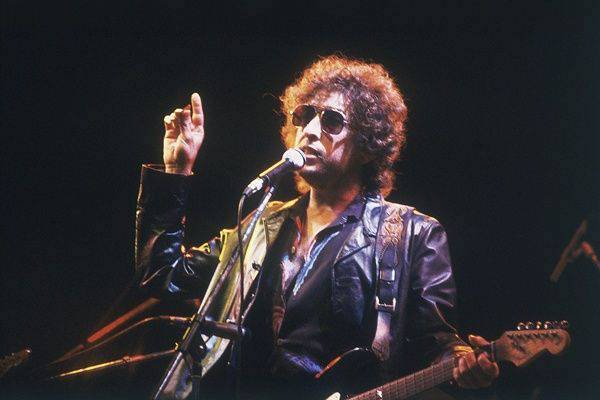 In the late 70s, Dylan performed wearing a leather jacket. He looked like a rocker but spoke like a preacher.
In the late 70s, Dylan performed wearing a leather jacket. He looked like a rocker but spoke like a preacher.
If the most recent literature Nobel Prize winner has chosen to reveal anything about himself, it is that he is a great reader of the Bible. His faith, on the other hand, is something much more complex. His spiritual pilgrimage covers various periods of his life but he has given barely no interviews over the last few decades. We are talking about a real enigma, even for his family and friends.
Finding out to whom he was married was one of the main revelations for Sounes in the recent biography of Dylan. If we don’t even know that, how can we even starts to talk about his personal faith.
One of the most impressive things that you find when you read about his life, something that I have done a lot of, is that even the people that he lives with don’t know where he is when he goes on one of his many walkabouts. Some say that they even see him walking the streets like a vagabond, fitting into that great tradition of musicians without home. He is so caught up in his own world that he is incapable committing himself to anyone and is always going against the current.
He was born in Duluth (Minnesota) in 1941, but not only did he change his name on arriving to New York in 1962, taking his name from the poet Dylan Thomas, he practically reinvented his whole life story. It is no wonder that his “Chronicles” begin with that harsh winter when he arrived in New York, the year before. Although he had recorded a rock album previously, when he arrived in the Village he became a folk singer. When everyone had got to know him for that genre, he went back to rock in 1965.
Up to that year, no one on stage was singing anything other than “girl meets boy” songs. From the Beatles to the Rolling Stones, they all changed their way of writing lyrics under the influence of Dylan. As it has sometimes been said, if Elvis moves your body, Dylan directs your brain, but he does it with an extremely complex form of poetry. It is not at all easy to understand what he is talking about.
He is always going against the current, having been considered by some as a protest singer-songwriter, he turned away from social movements, a volt-face for which – as the recent documentary by Martin Scorsese shows– Joan Baez never forgave him. In the psychedelic years he focused on county music with albums like “John Wesley Harding”, full of Biblical references and references to St Augustin. Although he is known for being surprising and unpredictable, his most spectacular about-turn was his deep immersion in Christianity at the end of 1978.
STORY OF A CONVERSION
An exhausting world tour marked a period of frenetic activity after the failure of Dylan’s marriage with Sara. He married her in secret in 1965, they had four children (five, counting a child from a previous relationship), and although they separated in 1974 (at the time of “Blood on the Tracks”), they had reconciled the following year (when he did “Desire”). But his divorce in 1977 marked the beginning of a long battle for the custody of his children, who have always been very important for him. Many of his songs describe the story of love and hate that summed up his marriage to Sara.
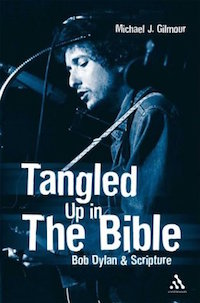 No book has had more influence on Dylan's poetry than the Bible.
No book has had more influence on Dylan's poetry than the Bible.Dylan felt so unhappy at that point that he had started to seriously think about the possibility of suicide. This is something unusual in him as he tends to be more aggressive than desperate. Some of his friends and musicians in his band had become Christian, following the excesses of the 1960s and 70s, when many of them had seen their lives ruined by drugs and alcohol. It has also been said that Dylan had a vision of Jesus as the King of kings in a hotel room in Tucson (Arizona). The fact is that if one person was instrumental in his conversion it was an Afro-American woman called Mary Alice Artes, who had become part of the Vineyard Community, a small evangelical church in the valley of San Fernando in Los Angeles.
This community had been founded in 1974 by a pastor and singer of Lutheran origins, Ken Gulliksen. Being a small church, it didn’t have its own premises so it met in rented rooms or on the beach itself. At the beginning of 1979, Artes put Dylan in touch with two pastors in this community, with whom he began a discipleship course, studying the Bible with them every morning for more than three months. They were both baptised that same year. A key book for him at that time was “The Late Great Planet Earth”, Hal Lindsay’s own personal apocalyptic vision, through which Dylan understood that humanity was on the edge of the battle of Armageddon, a world conflict that would begin when Russia attacked the Middle East, and China entered the fray with an army of two million soldiers.
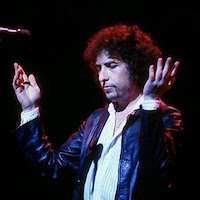 His concerts in San Francisco show a different Dylan, he refuses to play his old songs.
His concerts in San Francisco show a different Dylan, he refuses to play his old songs.Dylan was clearly looking for something that would make sense of his life. He was anxious and stressed. He drank too much alcohol and felt guilty and disoriented. He felt so low that he needed something or someone to help him get up. “Ya know I just couldn't make it by myself”, he sang in “Precious Angel”: “How was I to know you'd be the one/To show me I was blinded, to show me I was gone/How weak was the foundation I was standing upon?”. And he confesses to the “Covenant Woman”: “I've been broken, shattered like an empty cup /I'm just waiting on the Lord to rebuild and fill me up”, once he has found a God-fearing woman. A journalist who has written a book about that period, Paul William, recognises that even though he is not a Christian, the gratitude Dylan felt towards God and the woman that showed him the way to him is expressed in such a beautiful and humble way, that even as a stranger to the faith, he can’t help but be moved.
MORAL DILEMMAS
His new faith began to inspire songs that were so different to his usual style, that he thought about passing them on to an Afro-American singer. In the end, however, he decided to record “Slow Train Coming” in 1979, an album that speaks directly about his new relationship with Jesus. His first concerts in San Francisco show a very different Dylan. He refused to sing his old songs, repeating the words of Paul to the Corinthians: “The old has gone, the new is here!′. His shows began with gospel songs sung by the women who accompanied him at that time, with whom he is said to have a number of relationships. The surprising thing is that his faith does not seem to have had a big impact on his sexual morality.
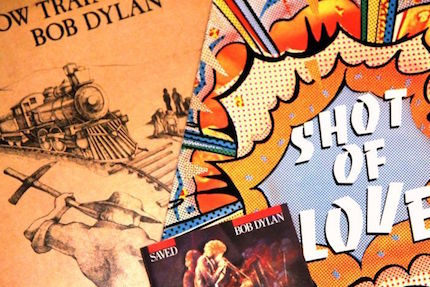 The records of the so-called Christian season of Dylan are more valued now.
The records of the so-called Christian season of Dylan are more valued now.All these Afro-American singers said themselves to be Christians. Bob prayed with them and with his musicians before the concert, often being spotted holding hands in a circle. Wearing his black leather jacket, he looked like a rock singer, but he spoke like a preacher. His sermons provoked shouts from the crowds who did not know how to react to it all. At that time, he was widely ridiculed by critics. A columnist in the San Francisco Chronicle said: “Dylan has written some the most banal, uninspired, and inventionless songs of his career for his Jesus phase. Years from now, when social historians look back over these years, Dylan’s conversion will serve as a concise metaphor for the vast emptiness of the era.”
Today, no one doubts the sincerity of his experience. In “What can I do for you?”, Dylan was singing to God: “You have laid down Your life for me.”. And his prayer was sincere. He could say: “I've escaped death so many times, I know I'm only living/By the saving grace that's over me.” Dylan was truly grateful. He really believed in what he was singing, and ultimately he suffered by making his faith public. That is the picture that Francesco Clemente also paints in another book about that time, when Dylan seemed to be so stubborn and steadfast about his beliefs. But he soon discovered another reality: “It's the ways of the flesh to war against the spirit/Twenty-four hours a day you can feel it and you can hear it” (Solid Rock).
SPIRITUAL BATTLE
What then remains of his faith? Many have asked me the same question since the essay that I did on Dylan in 1985 for the Spanish publisher Andamio. The truth is that I still don’t know what to say. It is difficult to know anything with any certainty about the living legend. His interviews tend to be based on laconic statements; he hardly has a social life; and he hardly ever says anything during his concerts. In one of the latest biographies, the London journalist Howard Sounes clearly states that Dylan has never renounced his faith in Jesus. However, the lyrics of some of his songs point to a spiritual battle.
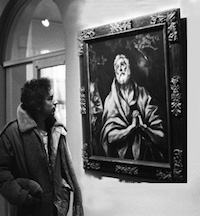 Dylan has a long spiritual journey.
Dylan has a long spiritual journey.“Satan whispers to ya, "Well, I don't want to bore ya,/But when ya get tired of the Miss So-and-so I got another woman for ya." He sings in “Trouble in Mind”. These are probably some of the most revealing verses that Dylan has ever written. Here we see the reality of his problem, which is clearly seen in his difficult relationship with sex. That is what “you're all the time defending what you can never justify.”… “Everybody's doing it so I guess it can't be wrong.” Here lie all his fears, doubts and the source of his misery, that have jostled in his mind all these years. His biography shows us how he goes from one relationship to another, hoping that a woman will redeem him from his anxiety, which makes him call to God: “Lord, take away this trouble in mind.”.
“Here comes Satan, prince of the power of the air,/He's gonna make you a law unto yourself, gonna build a bird's nest in your hair./He's gonna deaden your conscience 'til you worship the work of your own hands,/You'll be serving strangers in a strange, forsaken land.”
I cannot listen to these word in “Trouble in Mind” without thinking of Dylan now, alone and isolated. That is why some of us continue praying for him, that he may find the peace that he has still not found. Because as he knows full well, as it is one of his favourite songs, “But you're gonna have to serve somebody, yes/Indeed you're gonna have to serve somebody/Well, it may be the devil or it may be the Lord/ But you're gonna have to serve somebody.”

Las opiniones vertidas por nuestros colaboradores se realizan a nivel personal, pudiendo coincidir o no con la postura de la dirección de Protestante Digital.
Si quieres comentar o